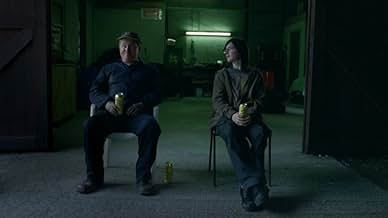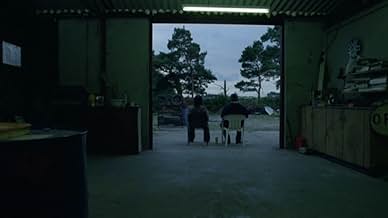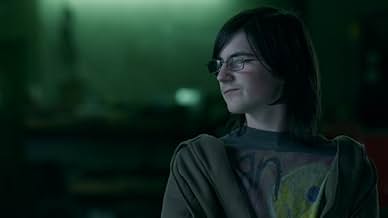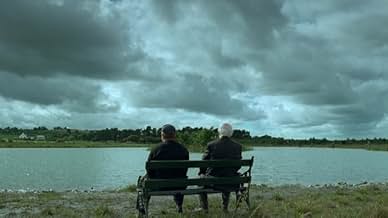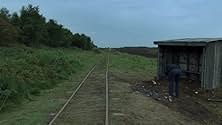IMDb-BEWERTUNG
7,1/10
3203
IHRE BEWERTUNG
Füge eine Handlung in deiner Sprache hinzuA tragicomedy set in the world of gas stations in rural Ireland, where over-diligent employee of the garage searches for intimacy during the course of a life-changing summer.A tragicomedy set in the world of gas stations in rural Ireland, where over-diligent employee of the garage searches for intimacy during the course of a life-changing summer.A tragicomedy set in the world of gas stations in rural Ireland, where over-diligent employee of the garage searches for intimacy during the course of a life-changing summer.
- Auszeichnungen
- 12 Gewinne & 14 Nominierungen insgesamt
Empfohlene Bewertungen
Garage is a strange film, good but strange, its one of those films that can hold your attention despite nothing much really happening. It focuses on Josie, played by Pat Shortt, a garage attendant who isn't the shiniest tool in the box, he's harmless enough but his naivety means he is the butt of jokes and lives a very lonely existence. The town is small and everyone knows everyone and with no real friends Josie grasps at any interaction from talking to the local horse, his fleeting chats to long distance lorry driver Dan and to the blokes in the pub despite the fact they are obviously horrible to him. But it's when he gets David as his new young assistant at the garage that things start to change. Saddled with his own problems, adolescence, alienation, isolation and growing pains, David and Josie strike up a friendship, David thinks Josie is brilliant as he supplies him with beers after work and for Josie it's just someone to talk with but the seemingly harmless relationship starts to take a darker turn. With a script that is at times equal in its ability to make you laugh and feel uncomfortable the film is one which will not sit easy with some audiences, ultimately its bleakness may be a little too much for some. That said all the performances are great and while showing how the simple life can be complicated it also shows how beautiful the country Ireland is, but it's really all about the crippling loneliness that can affect us as humans and Shortt's mannerisms and portrayal are startling and in this respect it really is his film. Add to this the subtlety and calmingly paced direction and you have a gem of a movie that leaves a bitter but brilliant taste.
Josie has been assigned the roles in life of pumping petrol and being the village idiot. He qualifies for the former role by being loyal to his boss, diligent about his work tasks, and friendly to the customers. He qualifies for the latter role because of some sort of mild mental disability that makes him slow to process ideas and not too good at standing up for himself. In fact he's not that stupid - one gets the impression that he was a slow child whom people got into the habit of talking down to, but that he understands more than other people acknowledge or that he even acknowledges himself.
People like Josie are litmus tests for distinguishing bullies from people who are fundamentally decent. The bullies, both teenagers and adults, treat him as if he doesn't even understand the cruel remarks they direct towards him. The people of conscience don't mock him because they know he can't respond in kind, and they recognise that he is capable of being hurt. However their kindness can only go so far: they can't engage with Josie as equals, they can't talk to him about relationships or children or careers, and the weather and the news of the town provide only a minute or two of conversational material.
Even more uncomfortable to watch than his treatment by the bullies is the use people make of him as a confidant of last resort. They unburden their hearts to him in the assumption that he has nothing better to do than listen to them, and expecting from him the kind of unconditional sympathy one would get from a pet dog. There is no reciprocation, nobody asks him how he is getting on, so Josie's unhappiness remains unarticulated beneath the conventional cheeriness that he presents to the world and the world expects of him.
The action of this slow moving film can be said to be driven by the intrusions of the wider world into a rural community. Josie's livelihood is threatened by economic development, and his role as the village idiot is threatened, if that's an appropriate word, by the dilution of the community with "blow ins". Being a village idiot is a cruel and marginal existence for Josie, but it does mean that when he takes a wrong turn, people have a ready explanation for his actions, and can be quite tactful and kind in nudging him back in the right direction. When the village fills up with more and more people who haven't known Josie since birth, his behaviour is in danger of being interpreted in a different way.
People like Josie are litmus tests for distinguishing bullies from people who are fundamentally decent. The bullies, both teenagers and adults, treat him as if he doesn't even understand the cruel remarks they direct towards him. The people of conscience don't mock him because they know he can't respond in kind, and they recognise that he is capable of being hurt. However their kindness can only go so far: they can't engage with Josie as equals, they can't talk to him about relationships or children or careers, and the weather and the news of the town provide only a minute or two of conversational material.
Even more uncomfortable to watch than his treatment by the bullies is the use people make of him as a confidant of last resort. They unburden their hearts to him in the assumption that he has nothing better to do than listen to them, and expecting from him the kind of unconditional sympathy one would get from a pet dog. There is no reciprocation, nobody asks him how he is getting on, so Josie's unhappiness remains unarticulated beneath the conventional cheeriness that he presents to the world and the world expects of him.
The action of this slow moving film can be said to be driven by the intrusions of the wider world into a rural community. Josie's livelihood is threatened by economic development, and his role as the village idiot is threatened, if that's an appropriate word, by the dilution of the community with "blow ins". Being a village idiot is a cruel and marginal existence for Josie, but it does mean that when he takes a wrong turn, people have a ready explanation for his actions, and can be quite tactful and kind in nudging him back in the right direction. When the village fills up with more and more people who haven't known Josie since birth, his behaviour is in danger of being interpreted in a different way.
I'm English but I lived in Ireland for 6 years until recently. Do not be fooled, Ireland today is not the vibrancy of Dublin or the bite of the Celtic tiger - like any country it is a mixture that has it's fair share of sad, empty and lonely places. This film attempts to portray this - and succeeds quite beautifully. The filmmakers are also "responsible" for the brilliant Adam and Paul -a snapshot of the struggle to live in modern day Dublin with a shocking drug habit... and Garage is no different - a few days in a life that tell us so much but share so little. The dialogue is sparse at best, just a nod and a smile to indicate friendship. The tiny visual clues show us one man's life in pictures - his lonely dinner (he bought one pork chop from the butcher) his wash in a sink. This film is one of those that is nothing and everything. I can't recommend it highly enough. Watch it and feel grateful that your life is full and vibrant. That it doesn't end with your putting your socks in your shoes...
Here we have a real rarity. An Irish film that really evidences an understanding of the place of film grammar in the art of the cinema. This rural tragi-comedy looks at a very uncomfortable sliver of the human condition.
It is, largely, about the way that the complexities of modern life can render the simple-minded tragically vulnerable. Under normal circumstances I hate - indeed loathe - films that 'overtly' mimic the works of dwarfingly great film makers. I am not sure that Abrahamson (the director) actually sought to mimic the wonderful, indeed sublime cinema of Robert Bresson, but I am sure that that is exactly what comes to mind when the film is watched. Thematically, it has much in common with 'Mouchette' (not best Bresson, but very good Bresson!). Stylistically, it resembles parts of 'L'Argent'! That the above is the case and it still grips and appeals is a great credit to the film makers. But it is not completely 'echt' of course. There are parts of Bresson's magisterial style (his use of close ups, and his total command of sound for example) that are largely missing, but, make no mistake, this is a wonderful piece of cinema.
At the centre of it is the character of Josie, a harmless simpleton, whose guileless sincerity leads him to be the butt of the cruel humour of the would-be sophisticates with whom he shares parts of his rural existence. But fate has an even crueller plan for Josie.
Effortlessly characterised by comedian Pat Shortt, the director's unflinching gaze shows Josie's blameless naiveté in heart-rending detail - his loneliness, his pain at the cruel jibes and his unreasoned optimism.
I really hate the style of cinema that seeks to drag its audience into a slough of despond, but though tragic, 'Garage' doesn't do that, because it retains its clear belief in cinema and its potential to lift the human spirit to undreamed of heights.
It is, largely, about the way that the complexities of modern life can render the simple-minded tragically vulnerable. Under normal circumstances I hate - indeed loathe - films that 'overtly' mimic the works of dwarfingly great film makers. I am not sure that Abrahamson (the director) actually sought to mimic the wonderful, indeed sublime cinema of Robert Bresson, but I am sure that that is exactly what comes to mind when the film is watched. Thematically, it has much in common with 'Mouchette' (not best Bresson, but very good Bresson!). Stylistically, it resembles parts of 'L'Argent'! That the above is the case and it still grips and appeals is a great credit to the film makers. But it is not completely 'echt' of course. There are parts of Bresson's magisterial style (his use of close ups, and his total command of sound for example) that are largely missing, but, make no mistake, this is a wonderful piece of cinema.
At the centre of it is the character of Josie, a harmless simpleton, whose guileless sincerity leads him to be the butt of the cruel humour of the would-be sophisticates with whom he shares parts of his rural existence. But fate has an even crueller plan for Josie.
Effortlessly characterised by comedian Pat Shortt, the director's unflinching gaze shows Josie's blameless naiveté in heart-rending detail - his loneliness, his pain at the cruel jibes and his unreasoned optimism.
I really hate the style of cinema that seeks to drag its audience into a slough of despond, but though tragic, 'Garage' doesn't do that, because it retains its clear belief in cinema and its potential to lift the human spirit to undreamed of heights.
Garage is Lenny Abrahamson's 2007, award winning, (Prix Art et Essai) Irish drama, starring Pat Shortt. Shortt plays Josie, a simple, tragic character, that lives in and runs the garage in a Tipperary backwater, owned by his former schoolmate, Mr. Gallagher. His life changes over the course of one Summer, when Gallagher introduces him to a boy named David, his new workmate, and a flawed relationship begins to develop. The acting is the most realistic I've ever seen. Every character in this film is taken straight from real life. They might be fictional characters, but each and every one of them exist in villages and towns throughout Ireland. Josie might seem precious and quaint, but there are thousands out there exactly like him. Each role is played to almost frightening accuracy. The Garda, played by Denis Conway, was so real in his attitude and all his dialogue, that it sent chills up my spine. It was acted in an unnaturally close manner to that of a real Garda. The plot doesn't really go very far. It starts in much the same place as it finishes. Although, perhaps it finishes more poignantly than it starts, the poignancy lies in the character of Josie himself and is present throughout the film. Peter Robertson, the Director of Photography, did a superb job. The cinematography is excellent. It's all perfectly framed and captures a certain beauty of location, without losing any realism. Living in a similar location to where this was filmed, I can personally vouch for the accuracy of every aspect of this film. It's amazing. That, funnily enough, was my main reason for disliking this film. I watch films to escape from that sad reality, and it really isn't all that pleasant to have such a close to the bone film in front of your eyes. That was also why I hated Pat Shortt's comedy series, Killinascully. Indeed there are quite a few actors from Killinascully in Garage. People from my area (mainly tractor driving hicks) see things like Killinascully and take them as an instruction manual for life, rather than a comedy series mocking them. So, the main strength of this film, it's realism, is also, for me, it's greatest weakness. I really must congratulate the director on his accuracy, which was outstanding but not appealing to me. I'd say, if you want to know what rural Ireland is really like, watch this. If you live there, just go outside. Or preferably don't. I would recommend seeing this if just for seeing Pat Shortt in a non comedic role. It's a hugely interesting film that deserves to be taken very seriously. I just didn't find it a pleasure to watch. I'm giving it a 6 out of 10, but I'm certain it deserves more.
Wusstest du schon
- WissenswertesThe reason why this film received the highest UK cinema rating - 18 - is entirely due to the close-up of the porn video that Josie receives from a van driver.
- PatzerWhen Carmel offers Josie a bag for his shopping, she gives him a plastic bag, but does not charge him the 22c plastic bag levy in place in Ireland. This was probably a kindness on her part.
- VerbindungenFeatures The Affair (2006)
- SoundtracksRide On
written by Jimmy MacCarthy
published by Universal Music Publishing Ltd.
background music in the pub
Top-Auswahl
Melde dich zum Bewerten an und greife auf die Watchlist für personalisierte Empfehlungen zu.
Details
- Erscheinungsdatum
- Herkunftsland
- Offizielle Standorte
- Sprache
- Auch bekannt als
- Garaje
- Drehorte
- Produktionsfirmen
- Weitere beteiligte Unternehmen bei IMDbPro anzeigen
Box Office
- Weltweiter Bruttoertrag
- 972.491 $
- Laufzeit1 Stunde 25 Minuten
- Farbe
- Seitenverhältnis
- 1.85 : 1
Zu dieser Seite beitragen
Bearbeitung vorschlagen oder fehlenden Inhalt hinzufügen


